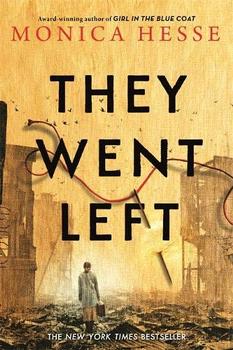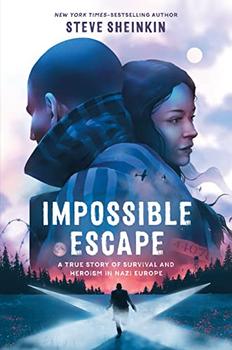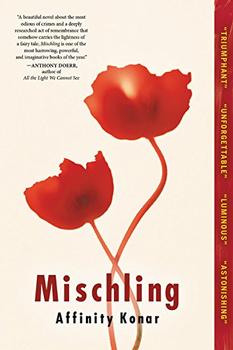Summary | Excerpt | Reading Guide | Reviews | Beyond the book | Read-Alikes | Genres & Themes | Author Bio

Critics' Opinion:
Readers' Opinion:
First Published:
Apr 2020, 384 pages
Paperback:
Apr 2021, 384 pages
 Book Reviewed by:
Book Reviewed by:
Debbie Morrison
Buy This Book
As World War II comes to an end, Zofia Lederman, an 18-year-old Polish Jew, tries to rebuild her life after being liberated from a Nazi concentration camp. It is August of 1945 in Monica Hesse's historical Young Adult novel, They Went Left, and Zofia is determined to find her younger brother, Abek. He is the only other living member of the Lederman family, and from the outset of the novel readers can sense the difficulty of Zofia's task, as she is a self-described "nothing-girl." The concept of nothingness emerges as a deep wound and a pervasive trauma that weaves itself through every aspect of the characters' lives.
To find her brother, Zofia must contend with the litany of "nothing" that appears in the first third of the novel. When describing herself and the other "nothing-girls," many of whom remain in the hospital months after their liberation, Zofia says, "We have no addresses to exchange. We have nothing. We weigh nothing, we feel nothing, we existed on nothing, for years." On her way back to her family home where she thinks Abek might be waiting, Zofia notices an old woman tidying the front of a house that has been decimated, noting that "behind her is nothing. Rubble." When she finally reaches her family's old apartment, Zofia thinks, "They left me trash. They left me nothing. They left us nothing." In addition to the protagonist's years of having no food and no clothes, a sort of personal nothingness, the author also highlights physical ruin in the landscape as a nothingness that the characters must reconcile as well. The personal nothingness of war that Zofia experiences is mirrored by the rubble, boarded up windows, and trash in her former hometown. However, the most difficult nothingness that Hesse presents to both readers and characters is wholly intangible. Zofia says of the nothing-girls, "Our minds are nothing. That's the biggest nothing." This nothingness is an acute mashup of PTSD, anxiety, depression and survivor's guilt. As result, there are voids in Zofia's memory and cognitive loops that are as debilitating as the frostbite that claimed two of her toes.
Rather than being overwrought as a theme or device, this series of nothings underscores the morass of desolation that the characters have to navigate. Because of it, readers are drawn deeper into the emotional core of the novel, deeper into the questions raised by the horrors of a post-Holocaust world, and deeper into the mystery of what really happened to Abek. Zofia articulates one of these questions plainly, asking, "If my options were never being able to find my brother, or knowing for sure that something terrible had happened to him, which would I choose? What's the line between the amount of information that brings hope and the amount that brings despair?" These questions and considerations are central to the plot and propel the narrative forward.
Although the idea of nothingness casts a long shadow, a resilient bud of hope begins to bloom alongside it in the second half of the book. Like many YA novels, Hesse's work is a bildungsroman, after all, which has its roots in a German word meaning "building or formation." In setting off to find her brother rather than choosing an easy life with Dima, the Russian soldier who saved her from the camp, readers have reason to hope that despite whatever else might happen, Zofia will survive to build a meaningful life for herself. The launching pad of that life is Foehrenwald, a refugee camp in Germany where she believes Abek may have been taken. There, Zofia meets Breine, another Holocaust survivor who has gotten engaged a mere five weeks after meeting her fiancé in the camp. In many ways, Breine acts as a foil to Zofia. Where Zofia is slow at times because of her missing toes, the gaps in her memory and her emotional trauma, Breine is fast-moving, full of energy and quick to love. When Zofia expresses some shock over Breine's decision to marry, Breine says, "Today I am choosing to love the person in front of me. Do you understand? Because he's here, I'm here, and we're ready to not be lonely together." Thus enters another central question of the novel: How do you live when those you love have died? While grappling with the search for her brother and her own burgeoning feelings of romantic love for the enigmatic Josef, also a resident of the camp, these are precisely the questions that Zofia must answer for herself.
True to the weight of its subject matter, They Went Left raises many questions that it does not answer; perhaps because there are no simple or absolute answers. The novel makes no claims to definitive truth about love and grief and survival, and therein lies much of its beauty and imaginative significance for readers.
![]() This review was originally published in The BookBrowse Review in June 2020, and has been updated for the
April 2021 edition.
Click here to go to this issue.
This review was originally published in The BookBrowse Review in June 2020, and has been updated for the
April 2021 edition.
Click here to go to this issue.

If you liked They Went Left, try these:

by Steve Sheinkin
Published 2023
From three-time National Book Award finalist and Newbery Honor author Steve Sheinkin, a true story of two Jewish teenagers racing against time during the Holocaust - one in hiding in Hungary, and the other in Auschwitz, plotting escape.

by Affinity Konar
Published 2017
"One of the most harrowing, powerful, and imaginative books of the year" (Anthony Doerr) about twin sisters fighting to survive the evils of World War II.





The Flower Sisters
by Michelle Collins Anderson
From the new Fannie Flagg of the Ozarks, a richly-woven story of family, forgiveness, and reinvention.

The House on Biscayne Bay
by Chanel Cleeton
As death stalks a gothic mansion in Miami, the lives of two women intertwine as the past and present collide.

The Funeral Cryer by Wenyan Lu
Debut novelist Wenyan Lu brings us this witty yet profound story about one woman's midlife reawakening in contemporary rural China.
Your guide toexceptional books
BookBrowse seeks out and recommends the best in contemporary fiction and nonfiction—books that not only engage and entertain but also deepen our understanding of ourselves and the world around us.